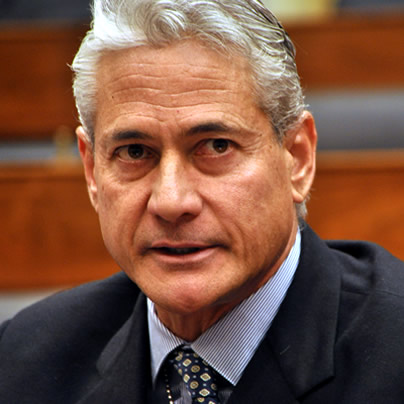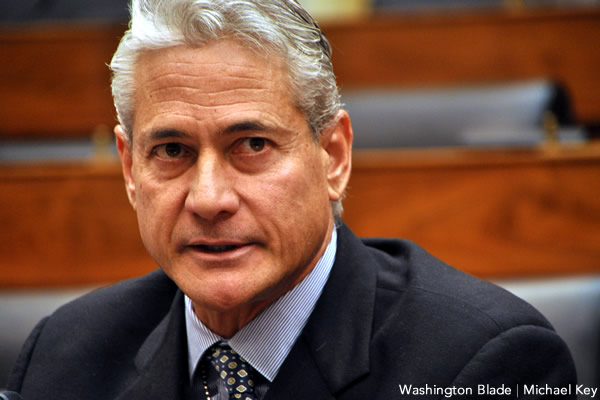News
Louganis: Russian Open Games marred by disruptions
Threats, smoke bomb, police target LGBT event


Retired Olympian Greg Louganis last December took part in a Russia briefing on Capitol Hill. (Washington Blade photo by Michael Key)
Retired Olympic diver Greg Louganis is among those who participated in the Russian Open Games that ended in Moscow on Sunday.
Louganis, who competed in a table tennis tournament during the five-day event that drew more than 300 LGBT athletes from Russia and other countries that include the U.S. and Sweden, arrived in the Russian capital early last week after he received a last-minute visa.
He left Moscow on Feb. 28.
The gay retired Olympian who won two gold medals during the 1998 Summer Olympics in Seoul and in the 1984 Summer Olympics in Los Angeles participated in a Feb. 27 press conference at a Moscow gay nightclub that opened the Russian Open Games. A bomb threat forced him and organizers to speak with reporters outside in the building’s parking lot.
The Washington Post reported the U.S. Embassy hosted a basketball game between participants and diplomats on Sunday after a smoke bomb disrupted a tournament two days earlier.
Louganis, who learned he was living with HIV six months before competing in Seoul, told the Blade police escorted him and more than 30 other Russian Open Games participants out of an ice rink on Feb. 27 after someone reported a group of “strange people” had arrived. He said they had simply gone to the rink for what he described as a “group workshop” about “teaching us some skating skills.”
“They made it clear we were not welcome,” said Louganis. “Just the looks of disdain as we were escorted off the premises was just really concerning.”
Louganis told the Blade he was sending e-mails from a coffee shop across the street from the building where the Russian LGBT Network was holding a panel after the ice rink incident when Konstantin Yablotskiy of the Russian LGBT Sport Federation, which organized the Russian Open Games, said the event had been interrupted. He said Yablotskiy told him somebody suddenly turned off the lights and told them the venue would have to close if they didn’t leave.
Louganis said Yablotskiy and Elvina Yuvakaeva of the Russian LGBT Sport Federation told only one person about venues they had secured for various competitions – and this person escorted participants to them after they met at a Metro station. Louganis told the Blade that Yablotskiy told him to take precautions that included not saying anything specific during telephone conversations because he was sure “others were listening.”
“It was a very interesting environment,” said Louganis, noting he had last been to Moscow more than a decade before the 1991 collapse of the Soviet Union. “It kind of reminded me of that; that everything was watched, was observed, scrutinized.”
The Russian Open Games took place a few days after the 2014 Winter Olympics in Sochi ended.
The Kremlin’s LGBT rights record that includes a 2013 law banning gay propaganda to minors overshadowed the Sochi games. Organizers of the Russian Open Games did not allow anyone under 18 to participate – they also included a disclaimer on its website that read “the information on this site is intended only for the use of those aged 18 and over.”
St. Petersburg Legislative Assemblyman Vitaly Milonov, who spearheaded his city’s gay propaganda ban that inspired the law Russian President Vladimir Putin signed last June, denounced the Russian Open Games. The lawmaker also urged Moscow Mayor Sergei Sobyanin to cancel the event.
Yuvakaeva last week said four venues that had initially agreed to host the games abruptly cancelled their agreements. The hotel where the Russian LGBT Network had planned to hold its forum also cancelled the scheduled event.
Louganis told the Blade he had not heard about the 10 LGBT rights advocates who were arrested near Moscow’s Red Square on Feb. 7 as they tried to sing the Russian national anthem while holding rainbow flags before the Sochi opening ceremony. He said a gay couple he met in the Russian capital told him about the arrests – and the officers who reportedly beat and threatened to sexually assault the activists while inside a local police station.
St. Petersburg police on Feb. 7 arrested Anastasia Smirnova and three other LGBT rights advocates as they tried to march with a banner in support of the campaign to add sexual orientation to the Olympic charter’s non-discrimination clause.
“I really wanted to be a participant [in the Russian Open Games] just to get an objective view rather than the propagandized vision of what it was in Sochi,” Louganis told the Blade, discussing Russia’s LGBT rights record. “Sochi I heard was wonderful and everybody was bragging and the media was over-reacting and all of this. You don’t know until you’re there.”
Louganis was also in Moscow as Russian troops prepared to take control of Ukraine’s Crimea region amid outrage from the U.S. and Europe.
The Kremlin on Monday reportedly issued an ultimatum that demanded the surrender of the crews of two Ukrainian warships on the predominantly Russian-speaking peninsula where Russia’s Black Sea Fleet is based. Secretary of State John Kerry is scheduled to arrive in the Ukrainian capital on Tuesday as tension between Washington and Moscow continues to escalate after the country’s Kremlin-backed president went into hiding following the deaths of dozens of anti-government protesters in Kiev.
“We were aware of what was going on with the borders being enforced,” said Louganis. “There was talk of invasion. There was this thing going on, but we were just focused on the event… with every turn we had to adjust and adjust and adjust. We were constantly trying to adjust to the immediate present and trying to make the Open Games as successful as we possibly could.”
Louganis added he was repeatedly impressed with the games’ organizers’ resilience against efforts to disrupt events.
“It was very impressive,” he told the Blade. “It was also very eye-opening for me from my personal experience.”

The Mexican Senate on Thursday approved a bill that would ban so-called conversion therapy in the country.
Yaaj México, a Mexican LGBTQ rights group, on X noted the measure passed by a 77-4 vote margin with 15 abstentions. The Chamber of Deputies, the lower house of Mexico’s congress, approved the bill last month that, among other things, would subject conversion therapy practitioners to between two and six years in prison and fines.
The Senate on its X account described conversion therapy as “practices that have incentivized the violation of human rights of the LGBTTTIQ+ community.”
“The Senate moved (to) sanction therapies that impede or annul a person’s orientation or gender identity,” it said. “There are aggravating factors when the practices are done to minors, older adults and people with disabilities.”
Mexico City and the states of Oaxaca, Quintana Roo, Jalisco and Sonora are among the Mexican jurisdictions that have banned the discredited practice.
The Senate in 2022 passed a conversion therapy ban bill, but the House of Deputies did not approve it. It is not immediately clear whether President Andrés Manuel López Obrador supports the ban.
Canada, Brazil, Belgium, Germany, France, and New Zealand are among the countries that ban conversion therapy. Virginia, California, and D.C. are among the U.S. jurisdictions that prohibit the practice for minors.
The White House
Four states to ignore new Title IX rules protecting transgender students
Biden administration last Friday released final regulations

BY ERIN REED | Last Friday, the Biden administration released its final Title IX rules, which include protections for LGBTQ students by clarifying that Title IX forbids discrimination based on sexual orientation and gender identity.
The rule change could have a significant impact as it would supersede bathroom bans and other discriminatory policies that have become increasingly common in Republican states within the U.S.
As of Thursday morning, however, officials in at least four states — Oklahoma, Louisiana, Florida, and South Carolina — have directed schools to ignore the regulations, potentially setting up a federal showdown that may ultimately end up in a protracted court battle in the lead-up to the 2024 elections.
Louisiana State Superintendent of Education Cade Brumley was the first to respond, decrying the fact that the new Title IX regulations could block teachers and other students from exercising what has been dubbed by some a “right to bully” transgender students by using their old names and pronouns intentionally.
Asserting that Title IX law does not protect trans and queer students, Brumley states that schools “should not alter policies or procedures at this time.” Critically, several courts have ruled that trans and queer students are protected by Title IX, including the 4th U.S. Circuit Court of Appeals in a recent case in West Virginia.
In South Carolina, Schools Supt. Ellen Weaver wrote in a letter that providing protections for trans and LGBTQ students under Title IX “would rescind 50 years of progress and equality of opportunity by putting girls and women at a disadvantage in the educational arena,” apparently leaving trans kids out of her definition of those who deserve progress and equality of opportunity.
She then directed schools to ignore the new directive while waiting for court challenges. While South Carolina does not have a bathroom ban or statewide “Don’t Say Gay or Trans” law, such bills continue to be proposed in the state.
Responding to the South Carolina letter, Chase Glenn of Alliance For Full Acceptance stated, “While Supt. Weaver may not personally support the rights of LGBTQ+ students, she has the responsibility as the top school leader in our state to ensure that all students have equal rights and protections, and a safe place to learn and be themselves. The flagrant disregard shown for the Title IX rule tells me that our superintendent unfortunately does not have the best interests of all students in mind.”
Florida Education Commissioner Manny Diaz also joined in instructing schools not to implement Title IX regulations. In a letter issued to area schools, Diaz stated that the new Title IX regulations were tantamount to “gaslighting the country into believing that biological sex no longer has any meaning.”
Governor Ron DeSantis approved of the letter and stated that Florida “will not comply.” Florida has notably been the site of some of the most viciously anti-queer and anti-trans legislation in recent history, including a “Don’t Say Gay or Trans” law that was used to force a trans female teacher to go by “Mr.”
State Education Supt. Ryan Walters of Oklahoma was the latest to echo similar sentiments. Walters has recently appointed the right-wing media figure Chaya Raichik of Libs of TikTok to an advisory role “to improve school safety,” and notably, Raichik has posed proudly with papers accusing her of instigating bomb threats with her incendiary posts about LGBTQ people in classrooms.
The Title IX policies have been universally applauded by large LGBTQ rights organizations in the U.S. Lambda Legal, a key figure in fighting anti-LGBTQ legislation nationwide, said that the regulations “clearly cover LGBTQ+ students, as well as survivors and pregnant and parenting students across race and gender identity.” The Human Rights Campaign also praised the rule, stating, “rule will be life-changing for so many LGBTQ+ youth and help ensure LGBTQ+ students can receive the same educational experience as their peers: Going to dances, safely using the restroom, and writing stories that tell the truth about their own lives.”
The rule is slated to go into effect Aug. 1, pending any legal challenges.
****************************************************************************

Erin Reed is a transgender woman (she/her pronouns) and researcher who tracks anti-LGBTQ+ legislation around the world and helps people become better advocates for their queer family, friends, colleagues, and community. Reed also is a social media consultant and public speaker.
******************************************************************************************
The preceding article was first published at Erin In The Morning and is republished with permission.
South America
Argentina government dismisses transgender public sector employees
Country’s Trans Labor Quota Law enacted in 2021

Protests have broken out across Argentina in recent weeks after the dismissal of transgender people from their government jobs.
President Javier Milei’s action is in stark contract with the progress seen in 2023, where the government’s hiring of trans people increased by 900 percent within the framework of the Trans Labor Quota Law that had been in place since 2021.
Among those affected is Sofia Diaz, a “survivor” who shared her testimony with the Washington Blade hours after she traveled from Chaco Province to Buenos Aires to protest her dismissal.
Presentes, an LGBTQ news agency, reported the government dismissed more than 85 trans employees in less than two weeks.
Diaz, 49, holds a degree in combined arts. She joined the National Social Security Administration (ANSES) in 2022 under the Trans Labor Inclusion Law. The layoffs began in January and left many people feeling uncertain and anguished. It was her turn a few days ago.
Diaz in an interview recounted how the situation became progressively more complicated, with difficulties in accessing information about her employment status and the eventual confirmation of dismissals through WhatsApp messages. This government action, according to Diaz, violates the law.
“We were on a Friday, I think on March 24, in the office and we have a WhatsApp group of other colleagues from all over Argentina who entered through the trans labor quota and they tell us if we can get our pay stubs on the intranet,” Diaz recalled. “So, I tried to enter, I could not, I talked to two other colleagues and they told me no, they could not, and so we went to another person. He couldn’t either.”
“Some people told us that it could be a system error. Well, we were never calm, let’s say not how this issue of installing fear and the perversion with which they do it ends,” she added. “This sadism of … inflicting pain and speculating with your misfortune and so on … is something that characterizes Javier Milei’s government.”
Diaz recalled a list of those dismissed from the agency began to circulate from the union in the afternoon. A colleague passed it on to her, “and well, unfortunately I was also on that list.”
“At that moment the whole weekend went by with anguish, crying, and talking with other colleagues from other places, not only trans, but everyone, everyone and everyone,” she said. “On Monday when we went to try to enter, we could not enter with the biometric, which is the thumb we had to use every morning to enter.”
Despite the difficult moment through which she is going, the trans activist stressed to the Blade that she will continue protesting and will even sue the government because her dismissal is illegal and “violates the constitution itself.”
The LGBTQ community and its allies have mobilized and organized demonstrations, highlighting the importance of defending the rights won and fighting against discrimination and exclusion. Diaz emphasized the fight is not only for the people affected today, but also for future generations, saying the historical memory of the struggles for inclusion and social justice must be kept alive.
“The Argentine government thus faces a key challenge in human and labor rights, where public pressure and social mobilization can play a determining role in protecting the rights of LGBTQ+ people,” Diaz said.
-

 State Department4 days ago
State Department4 days agoState Department releases annual human rights report
-

 South America2 days ago
South America2 days agoArgentina government dismisses transgender public sector employees
-

 District of Columbia2 days ago
District of Columbia2 days agoCatching up with the asexuals and aromantics of D.C.
-

 Politics4 days ago
Politics4 days agoSmithsonian staff concerned about future of LGBTQ programming amid GOP scrutiny









